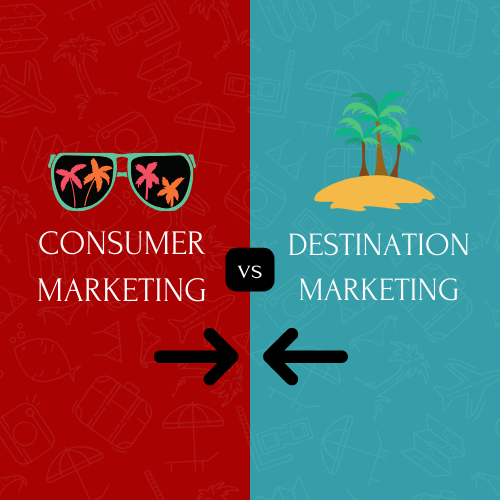
CONSUMER vs DESTINATION MARKETING: A Side by Side Comparison by Brian Applegarth
While consumer marketing focuses on promoting products or services to individual consumers, destination marketing promotes geographic locations to attract travelers and visitors.
Both approaches involve understanding target audiences, crafting compelling messages, and utilizing appropriate channels to achieve their respective objectives.
If we were to make a list of cannabis-themed destinations that exist today that are capable of enticing attention and dollars from the Cannabis Travel Audience, the list would include:
- craft growing regions like The Emerald Triangle
- mature cannabis-experience rich cities like West Hollywood, San Francisco, and Oakland
- travel worthy cannabis lounges, shops, and consumption spaces
- cannabis events
- travel worthy cannabis-themed experiences
With the above Destination list in mind, here’s a breakdown of how destination marketing is different from consumer marketing and why it matters.
Target Audience
- In consumer marketing, the primary focus is on individual cannabis consumers or households who purchase goods or services for personal use.
- In destination marketing, the target audience is the cannabis travel audience or visitors who are interested in exploring specific geographic locations or tourist attractions. The audience may include leisure or medical focused travelers, business travelers, event attendees, and other segments.
Product or Service
- Consumer marketing promotes tangible products or intangible services offered by businesses to meet the needs and desires of individual consumers. Products can range from everyday consumer goods to durables and services like banking and healthcare.
- Destination marketing promotes the overall experience and offerings of a specific destination to attract visitors. This includes promoting attractions, accommodations, activities, events, dining options, cultural experiences, and other amenities that contribute to the destination’s appeal.
Messaging and Positioning
- In consumer marketing, messaging and positioning focus on highlighting product features, benefits, unique selling points, and value propositions that resonate with target consumers. The goal is to create brand awareness, generate interest, and drive purchase intent.
- In destination marketing, messaging and positioning emphasize the destination’s unique attributes, experiences, and attractions. This includes showcasing the destination’s culture, history, natural beauty, landmarks, recreational opportunities, and hospitality offerings to inspire travelers and differentiate it from competitors.
Sales Channels
- consumer products and services are typically promoted and sold through various distribution channels, including retail stores, e-commerce websites, direct sales, wholesalers, and distributors.
- destinations are promoted through multiple channels, including tourism boards, destination marketing organizations, travel agencies, tour operators, online travel agencies, accommodations, attractions, and other travel-related businesses.
Metrics and Evaluation
- consumer marketing efforts are evaluated based on metrics such as sales revenue, market share, customer acquisition, customer retention, return on investment, and brand equity.
- destination marketing efforts are evaluated based on metrics such as visitation volume, hotel occupancy rates, tourist spending, length of stay, economic impact, destination awareness, visitor satisfaction, and return visits.
